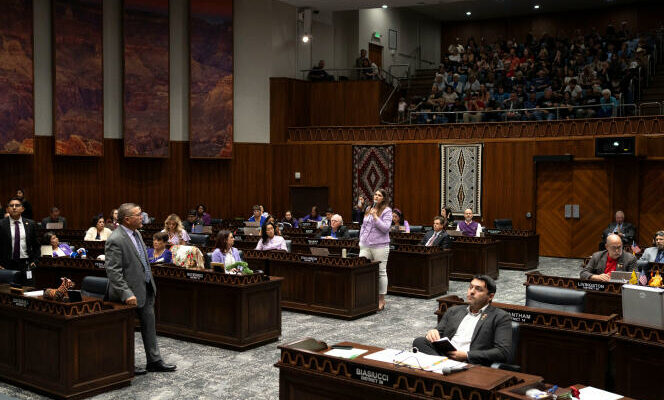This is a possible new turnaround on the theme of abortion in the United States, which occupies a major place in the presidential campaign before the November elections. The Arizona House of Representatives voted, Wednesday, April 24, to abolish an 1864 law which prohibited almost all abortions, and which had been deemed applicable two weeks ago by the Supreme Court of this state. Key state electorally. If the Arizona Senate follows suit as planned, Arizona would allow voluntary termination of pregnancy (abortion) up to 15 weeks.
Three moderate Republicans joined their votes with 29 Democrats to achieve a majority for the abolition of this law which prohibits all abortion from the moment of conception, unless the mother’s life is in danger. Neither rape nor incest are considered valid exceptions, according to the abolished law which caused great controversy in the country, being condemned by Joe Biden but also criticized in a more moderate way by Donald Trump.
Having remained dormant for decades, this law “is now applicable”, said the Arizona Supreme Court in its decision rendered on April 9. The law had been blocked since the U.S. Supreme Court’s Roe vs. Wade ruling in 1973, which guaranteed the constitutional right to abortion nationwide.
“A stain on our state”
But after the reversal of the Court’s jurisprudence which canceled in June 2022 this federal guarantee of the right to abortion, the attorney general of Arizona at the time, Mark Brnovich, a Republican, persuaded a judge to State that the 1864 ban could be applied. Under this law, approved even before Arizona became part of the United States in 1912, people assisting in an abortion could be prosecuted and sentenced to two to five years in prison.
decision “to reimpose a law dating from a time when Arizona was not a state, when the Civil War was raging and when women could not even vote, will go down in history as a stain on our state”, lamented, on April 9, the Attorney General of Arizona, Democrat Kris Mayes, who had long warned that she would not initiate any prosecution. But this could change depending on the elections since prosecutors are elected in the United States.
Dozens of people gathered outside the state Capitol before the scheduled meeting of the House and Senate, then sat in the public gallery as elected officials voted, many of them carrying signs or vestments showing their opposition to the right to abortion.
Initiative for a referendum
Promoters of a popular initiative recently announced that they had collected signatures for a referendum to enshrine abortion in the Arizona Constitution. If confirmed, this vote should take place at the same time as the presidential election in November, as will be the case for example in Florida, another decisive state.
Outgoing Democratic President Joe Biden is making the defense of women’s rights a major focus of his campaign for a second term, facing his Republican opponent Donald Trump. The latter himself prides himself on having, through his appointments to the Supreme Court of the United States, resulted in the reversal of jurisprudence of June 2022, but points out the electoral risks of an overly conservative position on abortion.
“Make no mistake, Arizonans are now living in 1864 because Donald Trump dismantled Roe vs. Wade,” Democratic Sen. Priya Sundareshan of Tucson said at a news conference Wednesday hosted by Joe Biden’s campaign team and the Arizona Democratic Party. The repeal vote comes a day after the US president said his Republican rival had created a “health care crisis for women across the country” by hindering their access to care.
